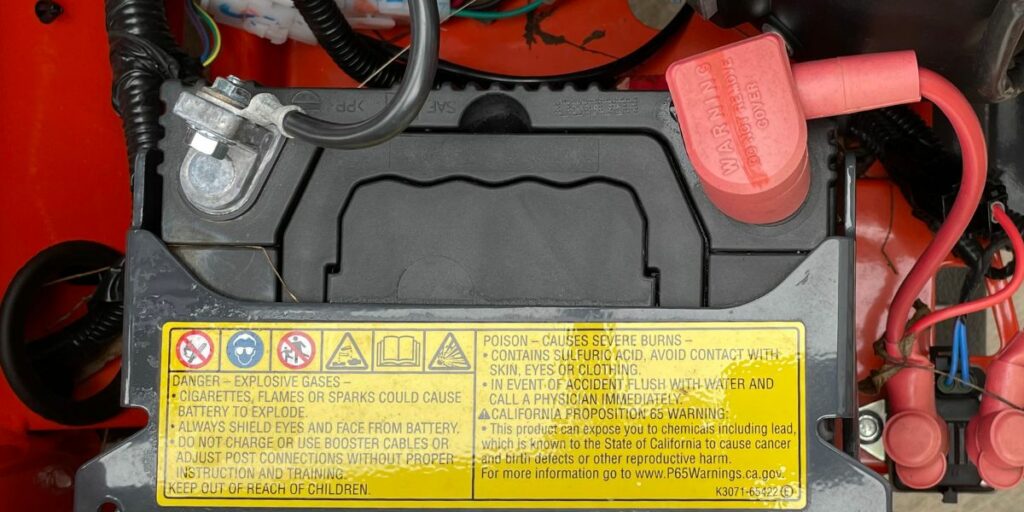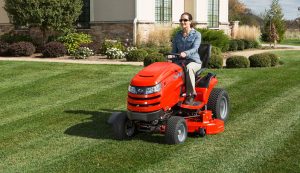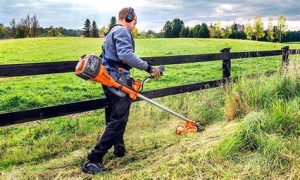Kubota Lawn Mower Won’t Start (5 Things)
When you try to start your mower, all you hear is a constant clicking sound. If this occurs, you’ll need to find a way to stop the engine from being started. Below, I’ve outlined several potential reasons for and approaches to fixing your first issue.
When the wiring and cables on a Kubota lawn mower are frayed or corroded, the battery is weak, the ground is faulty, the beginning solenoid is defective, or the starter motor has failed, the mower will click and refuse to start or turn over.
Please observe all of the safety measures outlined in your Kubota’s handbook. If you don’t feel confident working on the electrical system of your mower, you should have it checked out by a professional technician.
Before attempting any electrical repairs, make sure the negative (black) line is disconnected from the battery.

Table of Contents
What Causes the Clicking Sound on a Kubota Lawnmower That Won’t Start or Turn Over
Battery, cable, and terminal damage on a Kubota lawn mower
Prior to examining the batteries, make sure the cable, wiring, and terminals are in good working order. Due of the mower’s continual vibration, they may get unfastened.
Check the connections between the battery and solenoid, as well as between the solenoid and the starting motor.
Look for corrosion on the terminals and connectors that might break the circuit. Any rust or corrosion must be cleaned up.
Mower rusting may be avoided by drying it well before keeping it in a dry place.
SOLUTION: Fix or replace the frayed or damaged wires and cables. Your Kubota mower’s inability to start might be caused by a dead battery or damaged wires.
First, disconnect the batteries from the mower, and then take apart any corroded parts you find.
The combination of a wire brush and two cups of water with three heaping teaspoons of baking soda should do the trick. Corroded wire should be fixed or replaced.
To prevent corrosion of the terminals and wires, dielectric grease should be used. When terminals are worn out or broken, replace them.
A Lawnmower with a Weak or Dead Kubota Battery
If the battery isn’t strong enough, you can have trouble starting the engine.
Battery voltage should be checked. If the battery is low, you may charge it by connecting it to a battery charger. A dead battery is one that won’t keep a charge and so has to be replaced.
If you are able to charge the battery, but it still dies, the Kubota charging mechanism may need to be inspected. Please see the charging system section just below the conclusion of this piece.
Verify the lawnmower’s Kubota battery’s voltage.
Connect the multimeter’s red and black probes to the corresponding connections. The majority of batteries for Kubota mowers operate at 12 volts.
It’s possible to receive a voltage reading of 11.5, 12.2, or even 12.7 on a 12-volt battery. The voltage reading of a fully charged battery should be about 12.7 volts, while that on a nearly dead battery should be closer to 11.5 volts.
Recharging the battery of a Kubota lawn mower
- Protect your eyes and skin from acid and electricity by using protective goggles and gloves.
- To use the battery, you’ll need to access the terminals. To get to the battery or battery case, you may need to unscrew the lawnmower’s body.
- The battery should be left in its case with the terminal connections still connected.
- The red cable (the one with the plus sign on it) should be plugged into the positive battery terminal first, followed by the black wire (the one with the negative sign on it)
- Do not let any part of the charging cords or clamps come into contact with your skin.
- Modify the charger’s settings to the required voltage and current. In most cases, a lawn mower will have a 12-volt motor. A higher current (two amps initially, and up to ten amps) will speed up the battery charging process.
- Don’t disconnect the charger until the battery charging gauge indicates it is completely charged.
SOLUTION: If the Kubota tractor’s battery is low, you may recharge it using a battery charger. It’s time to get a new battery if you notice that the old one won’t retain a charge.
The charging mechanism may be at fault if the battery may be fully charged using a battery charger but still dies every time you want to use your Kubota.
Unfavorable Terrain for a Kubota Lawnmower
Verify the Kubota’s black ground line connecting the battery to the frame. It ought to be free of corrosion and capable of making solid contact.
Verify the solenoid’s ground connection as well. A solenoid with just three posts grounds itself.
SOLUTION: Repair a frayed grounding wire immediately. If there is rust on the battery or starting solenoid’s grounds, clean it off.
A Kubota Lawnmower with a Malfunctioning Starter Solenoid
The starting solenoid should be checked after you have ensured the battery, wires, and connections are in excellent working order. If your mower makes a clicking or buzzing noise but won’t start, this is likely the cause.
The solenoid functions as a toggle switch. The starting motor is activated by pressing a button on an electromagnet switch.
Most solenoids are attached to the starter itself. They need not be, though, in order to serve their purpose. To reach the solenoid, use the positive battery cable.
A faulty Kubota starting solenoid might be the result of a number of different issues. It’s possible for the internal spring to weaken or for the copper plate to corrode over time.
The starting solenoid might fail for a variety of reasons, including a poor ground, a weak starter, or a dead battery.
SOLUTION: Put the solenoid that starts the engine through its paces. In addition to wrenches, a volt-ohms meter, screwdriver, and continuity light will come in handy.
If you need help with the starting solenoid on your Kubota, look no further. Bypassing the solenoid to start the mower indicates that it needs to be replaced.
A Kubota Lawnmower with a Faulty Starter Motor
It might be your starter if you’ve already ruled out the battery, cables, wiring, ground, and starter solenoid and are still having trouble starting the engine. The starter may be taken out and examined.
SOLUTION: The cost of a lawn mower’s starter may vary widely. Before you go out and buy a new starting motor, it’s a good idea to get the diagnosis from your local dealership.
The starting may also be examined at a local repair shop specializing in starter and alternator repairs.
Related Topic:
The Kubota’s Battery Drains Due to a Faulty Charging System.
A Kubota mower with a faulty charging mechanism will not start if the battery is not kept adequately charged.
Follow the instructions here to test the charging system using a volt-ohm meter.
If your Kubota lawn mower’s battery stops being charged, you should have a professional who is knowledgeable with your charging system check it out and make any required repairs.
It might be difficult to pinpoint the source of a problem in a charging system.
If you don’t know how the mower’s charging mechanism works, you’ll probably simply wind up tossing components at it.
Since electrical components cannot be returned if they are installed incorrectly, this may quickly become costly. It might be an issue with the regulator, stator/alternator, or any other electrical component.
Is your Kubota Lawnmower Still Giving You Trouble?
The longer you keep a lawnmower, the more likely it is that you may have issues with it starting, not staying running, smoking, leaking gas, cutting poorly, vibrating, or some other problem.
I’ve compiled this manual to assist you save time and money the next time your Kubota mower breaks down.
It is preferable to have a professional handle diagnostics and repairs on your Kubota lawn mower if you are unclear how to do so properly.
Injuries to yourself or the lawnmower operator may be prevented in this way. If you’re having trouble with your lawn mower, go on over to the nearest Kubota dealer or service facility.






